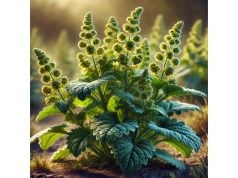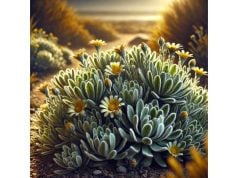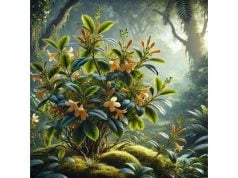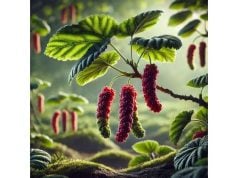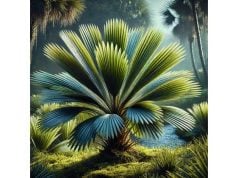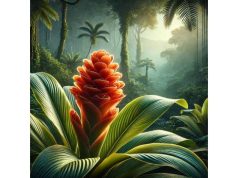
Deodar cedar is a Himalayan conifer with a long record in traditional South Asian medicine, where the wood, resin, and oils have been used for skin care, joint discomfort, breathing complaints, and household antiseptic uses. Modern interest focuses on its aromatic compounds and phenolic constituents, which may help explain its anti-inflammatory, antioxidant, and antimicrobial effects seen in laboratory and animal research. At the same time, deodar cedar is not a routine kitchen herb, and it is often sold in forms that vary widely in strength and purity. That makes quality control and safe use more important than with gentler botanicals. This guide gives a practical, evidence-aware overview of what deodar cedar contains, what it may help with, how it is commonly used, what dosage information actually exists, and where the safety limits are. The goal is clarity: useful traditional context, realistic expectations, and a cautious approach grounded in what is known today.
Key Insights
- Deodar cedar shows promising anti-inflammatory, antioxidant, and antimicrobial activity in preclinical studies, especially in topical applications.
- There is no standardized oral human dose for deodar cedar, and most dosage data come from animal or experimental formulations.
- For leave-on cedarwood oil products, keep dilution at or below 2% and patch test before broader skin use.
- Avoid use during pregnancy, breastfeeding, and in young children unless a qualified clinician specifically advises it.
- Species mix-ups matter: products sold as “cedarwood” may come from different plants with different risk profiles.
Table of Contents
- What is deodar cedar and what parts are used
- Key ingredients in deodar cedar
- What can deodar cedar help with
- How to use deodar cedar safely
- How much deodar cedar to use
- Side effects, interactions, and who should avoid it
- What does the evidence actually show
What is deodar cedar and what parts are used
Deodar cedar, scientifically known as Cedrus deodara, is a large evergreen conifer native to the western Himalayas and nearby mountain regions. It belongs to the pine family and is valued both as a landscape tree and as a traditional medicinal plant. In many herbal traditions, deodar cedar is treated as a warming, aromatic, resinous botanical rather than a daily tonic herb. That distinction matters because it is usually used in smaller, more targeted ways.
The parts most often discussed in medicinal contexts are:
- Wood and heartwood (often used for oils, extracts, and traditional preparations)
- Resin (used in topical and aromatic applications)
- Needles (used in some research and regional preparations)
- Essential oil (distilled from wood or other plant parts, depending on the product)
Traditional use patterns are broad. Historical and regional systems describe deodar cedar in preparations for:
- Joint and muscle discomfort
- Skin problems and wound care
- Respiratory complaints
- Digestive discomfort
- General inflammatory conditions
A practical point for readers today is that “deodar cedar” and “cedarwood” are not always interchangeable in the marketplace. Many commercial products are labeled simply as “cedarwood oil,” but they may come from different species and even different genera. That can change the chemical profile, scent, potency, and safety. A product made from Cedrus deodara is not the same as every product marketed as cedar.
In modern use, deodar cedar appears most often in:
- Topical products such as balms, ointments, massage oils, and skin formulas
- Essential oil blends for aroma and cosmetic use
- Herbal extracts in traditional medicine settings
- Research preparations used in animal and lab studies
It is less commonly used as a standardized capsule or tea in mainstream supplement markets, which is one reason dosage guidance is less clear than for herbs such as turmeric or ginger.
If you are using deodar cedar for wellness purposes, the first decision is not “how much” but which form. The form determines the likely effect, the safety profile, and the quality checks you need. A topical ointment for skin use, a diluted aromatic oil, and a concentrated extract are very different products, even when they come from the same tree.
That is why the best starting point is to understand what compounds are inside deodar cedar and how those compounds behave. Once you understand that chemistry, the benefits and precautions make much more sense.
Key ingredients in deodar cedar
Deodar cedar contains a complex mix of volatile and non-volatile compounds, and the profile changes by plant part, extraction method, and product type. This is one of the most important points in the whole guide: deodar cedar is chemically diverse, so a wood extract and a pine needle preparation will not behave the same way.
In broad terms, the plant contains several classes of bioactive compounds:
- Sesquiterpenes and terpenoids (common in aromatic wood oils)
- Phenolic compounds and phenolic acids (often more prominent in extracts and needle-based preparations)
- Flavonoid-related compounds
- Lignans and sterol-like compounds (reported in broader phytochemical reviews)
The aromatic fraction
The best-known deodar cedar constituents in aromatic products are sesquiterpene-rich compounds, including cedrene-related molecules and himachalene or himachalol-related compounds. These compounds are often linked to the plant’s:
- Characteristic woody aroma
- Potential anti-inflammatory activity
- Antimicrobial effects in laboratory testing
- Skin and respiratory irritation risk when concentrated or oxidized
These volatile compounds help explain why deodar cedar is used in oils, rubs, and aromatic products rather than mainly in food-like herbal formats.
The phenolic fraction
Needle and extract studies have identified phenolic acids and related compounds that can contribute antioxidant and metabolic effects in preclinical work. Examples reported in newer analytical studies include compounds such as:
- Chlorogenic acid
- Vanillic acid
- Syringic acid
- p-Coumaric acid
- Salicylic acid
- Benzoic acid derivatives
This is useful because it shows deodar cedar is not only an aromatic resinous plant. It also contains non-volatile compounds that may contribute to antioxidant and anti-inflammatory actions in extract-based preparations.
Why extraction method matters
A common mistake is assuming all deodar cedar products are equivalent. They are not. Chemical output depends on whether the product is:
- Steam-distilled oil
- Hydrodistilled oil
- Alcohol extract
- Methanol or other research extract
- Whole powder or coarse plant material
Each method pulls different compounds. A topical ointment made from a methanol wood extract can have a very different profile from a commercial essential oil diluted in carrier oil. That is why one study showing benefit in a topical extract cannot automatically be applied to a diffuser oil or an oral supplement.
What these ingredients may do
Based on preclinical evidence, deodar cedar compounds may act through several pathways:
- Reducing inflammatory signaling
- Scavenging reactive oxygen species
- Altering microbial growth
- Modulating tissue repair processes
- Influencing metabolism in certain experimental models
These are plausible and interesting mechanisms, but they are still mostly mechanistic and preclinical, not confirmed human outcomes.
For practical use, the ingredient takeaway is simple: look for products that clearly state the botanical name, plant part, and preparation type. Without that information, it is hard to predict benefits or safety with confidence.
What can deodar cedar help with
The strongest way to describe deodar cedar benefits is to separate traditional uses from modern evidence. Traditional use gives context and direction. Modern evidence tells us which uses are beginning to look plausible and which remain mostly historical.
Potential benefits with the most support so far
1. Skin support and wound-care potential
This is one of the more practical areas for deodar cedar. A topical wood extract formulation has shown encouraging burn-wound healing results in animal research, including better wound contraction and favorable tissue-level healing markers. The benefit is not proof of a finished consumer product, but it does support the traditional use of deodar cedar in skin-focused applications.
Realistic takeaway: deodar cedar may be most useful in topical formulations, especially where inflammation, skin stress, or minor irritation is part of the picture.
2. Anti-inflammatory and antioxidant activity
Deodar cedar has repeated preclinical signals for anti-inflammatory and antioxidant effects. These signals come from:
- Traditional pharmacology reports
- Extract studies
- Essential oil research
- Phytochemical analysis showing antioxidant-related compounds
This does not mean it is a substitute for medical treatment of inflammatory disease. It does mean deodar cedar is a biologically active plant with credible reasons for its historical use in painful and inflammatory conditions.
3. Antimicrobial activity
Laboratory studies have reported antimicrobial effects from deodar cedar constituents and preparations. In practice, this helps explain why the herb appears in traditional skin care, topical antiseptic uses, and household aromatic preparations.
Important caution: antimicrobial activity in a petri dish does not automatically translate to treatment of infections in people. It can support topical hygiene and formulation choices, but it does not replace proper diagnosis and treatment when infection is suspected.
Other possible areas of interest
Preclinical and traditional literature also discusses deodar cedar in relation to:
- Joint discomfort
- Respiratory complaints
- Digestive upset
- Metabolic regulation
- Hormone-related pathways in experimental models
Some newer animal and analytical work has explored anti-obesity and anti-androgenic activity, which is scientifically interesting, but these findings are still early. They should not be marketed as established clinical effects.
The “advantages” readers should understand
If you are comparing deodar cedar with more common herbs, its main advantages are:
- Multi-compound chemistry, which supports more than one biological pathway
- Strong aromatic profile, useful in external and sensory applications
- Traditional credibility, especially for topical and inflammatory uses
- Formulation flexibility, including oils, ointments, and extracts
Its biggest limitation is the same thing that makes it interesting: complexity. Because deodar cedar products vary so much, the benefit you get depends heavily on the exact preparation and how carefully it is used.
A good expectation is not “deodar cedar cures disease,” but rather “deodar cedar may be a useful supportive botanical, especially in topical and aromatic contexts, when chosen and used carefully.”
How to use deodar cedar safely
Deodar cedar is best approached as a specialty botanical. That means safe use starts with the right form and a clear purpose. Most people will use it topically or aromatically rather than orally, because human oral dosing data are limited and products are less standardized.
Common ways deodar cedar is used
1. Topical oil blends
This is one of the most common modern formats. A deodar cedar essential oil is mixed into a carrier oil (such as jojoba or sweet almond) and applied to a small area for:
- Massage
- Local discomfort
- Skin support
- Aromatic grounding
Best practice is to start with a low dilution and patch test first, especially if you have sensitive skin.
2. Ointments and balms
Traditional and research-inspired uses often favor thicker topical preparations. Ointments can be more practical than thin oils when the goal is staying power on the skin, such as:
- Dry or irritated areas
- Minor skin stress
- Targeted external application
This format is also easier to control because the dose is localized.
3. Aromatic use
Some people use cedar-type oils in diffusion or inhalation settings for a calming, woody scent profile. With deodar cedar, the main rule is ventilation and moderation. Aromatic use can be pleasant and supportive, but long or heavy exposure may trigger irritation in sensitive people.
4. Traditional extracts
In classical or regional herbal practice, deodar cedar may appear in compound preparations rather than as a single herb. If you use a traditional formula, the safest route is a trained practitioner who can identify the product, the plant part, and the intended duration.
Practical use tips that prevent problems
- Verify the botanical name on the label: Cedrus deodara
- Check the plant part if listed: wood, resin, or needles
- Avoid unlabeled “cedarwood” oils with no botanical identification
- Use fresh products and store them away from heat and light
- Patch test before broader skin use
- Do not apply near eyes, mucosa, or broken skin unless a clinician specifically advises it
- Do not assume diffuser-safe means skin-safe
Which form is best for beginners
For most readers, the safest starting point is a properly diluted topical product made by a reputable brand that clearly lists:
- Botanical name
- Dilution strength
- Ingredients
- Intended use
- Safety warnings
This is more predictable than buying a concentrated oil and improvising.
When not to self-experiment
Do not self-experiment with deodar cedar if your goal is to treat a major medical problem such as a deep wound, active infection, severe pain, or a chronic inflammatory disease flare. In those cases, it may have a role as supportive care, but not as first-line treatment.
Used thoughtfully, deodar cedar can be a useful botanical tool. Used casually, especially in concentrated form, it can cause avoidable side effects. That is why usage and dosage always need to be discussed together.
How much deodar cedar to use
This is the section most readers look for, and it is also where deodar cedar requires the most honesty: there is no standardized, evidence-based oral human dose for Cedrus deodara that can be recommended broadly. Most published dosage information comes from animal studies, experimental extracts, or general cedarwood oil guidance.
That does not make the herb unusable. It means dosing must be form-specific and conservative.
Practical dosage guidance by form
1. Topical essential oil use
For leave-on topical products, a cautious upper range commonly used in cedarwood oil safety guidance is:
- Up to 2% dilution in a carrier oil for leave-on skin use
That means:
- 1% = gentler starting point for sensitive skin
- 2% = common upper everyday limit for many adults in localized use
Start low and patch test. If there is redness, itching, or burning, stop.
2. Ointments and extract creams
In research, one deodar cedar wood extract ointment was tested at:
- 10% topical extract concentration in an animal burn model
This is useful evidence for formulation design, but it is not a direct consumer dosing recommendation. Research extracts are prepared under controlled conditions and may not match commercial products.
3. Oral use
For oral use, the safest guidance is:
- No standardized human oral dose has been established
Some newer animal work on deodar cedar pine needles used doses such as 0.6 g/kg per day in mice, but animal dosing should not be converted casually into a human regimen. The extraction, metabolism, and safety margins may be very different.
Timing and duration
Because clinical dosing studies are lacking, timing and duration are also not standardized. Practical rules:
- Topical use: start with short-term, localized use and reassess skin response after several days
- Aromatic use: use intermittently rather than continuous all-day exposure
- Oral use: avoid routine oral use without practitioner guidance and a clearly identified product
Variables that change the right amount
The “right” amount depends on:
- Product type (oil, ointment, extract, powder)
- Concentration
- Skin sensitivity
- Area of application
- Age
- Other medications
- Goal (aroma, skin support, massage, traditional formula)
A safer dosing mindset
With deodar cedar, it is better to think in this order:
- Choose the form
- Confirm species and quality
- Start with the lowest practical amount
- Monitor for irritation or intolerance
- Increase only if needed and tolerated
This approach may feel slower, but it matches the evidence. Deodar cedar is a promising traditional medicinal tree, yet modern dosing science is still catching up. Until better human data exist, conservative use is the safest and smartest strategy.
Side effects, interactions, and who should avoid it
Deodar cedar can be helpful, but it is not risk-free. The main safety issues come from concentrated oils, variable product quality, and the fact that many “cedarwood” products are not the same species. The best way to lower risk is to treat deodar cedar like a potent aromatic botanical, not a casual wellness add-on.
Common side effects and reactions
Skin irritation and sensitization
Topical cedar-type oils can cause:
- Redness
- Itching
- Burning
- Rash
- Delayed irritation after repeat use
Risk is higher when the oil is:
- Undiluted
- Oxidized from poor storage
- Applied to large areas
- Used on sensitive or already-inflamed skin
Patch testing is one of the simplest and most useful safety steps.
Respiratory irritation
Aromatic use is usually tolerated in small amounts, but some people may develop:
- Throat irritation
- Headache
- Cough
- Worsened symptoms in fragrance-sensitive individuals
This is more likely in enclosed rooms, with high diffuser output, or with long exposures.
Product confusion and species mismatch
One of the biggest hidden risks is species confusion. “Cedarwood oil” may refer to multiple species with very different chemistry. Some cedar-type oils outside Cedrus deodara carry compounds that are less suitable for therapeutic or cosmetic use. If the label does not list the botanical name, do not assume it is deodar cedar.
Potential interactions
Clinical interaction data for deodar cedar are limited, but caution is reasonable because aromatic terpenes and sesquiterpenes can affect biological pathways and may influence metabolism. Use extra caution if you take:
- Sedating medications
- Multiple topical medicated products
- Drugs with narrow dosing windows
- Medicines metabolized through liver enzyme pathways
This does not prove an interaction will happen. It means the evidence gap is large enough that combining concentrated botanical oils with prescription therapy deserves a more careful approach.
Who should avoid deodar cedar unless medically advised
- Pregnant or breastfeeding individuals
- Young children
- People with asthma or fragrance-triggered symptoms
- People with eczema, contact dermatitis, or highly reactive skin
- Anyone with a known allergy to cedar, conifers, or essential oils
- People planning surgery, especially if using concentrated oils regularly
Safety rules that make a real difference
- Do not ingest concentrated essential oil
- Do not apply undiluted oil to skin
- Do not use on deep wounds or infected skin without medical care
- Do not use near the eyes or mucous membranes
- Stop immediately if irritation or breathing symptoms occur
If you are using deodar cedar as part of a larger herbal routine, keep a simple log of product, dilution, and reaction. This helps you tell the difference between a useful response and a sensitivity issue.
What does the evidence actually show
Deodar cedar has a meaningful traditional history and a growing preclinical research base, but the current evidence is still uneven. For readers who want a balanced answer to “does it work,” the most accurate answer is: it shows real pharmacological promise, especially in topical and anti-inflammatory contexts, but human clinical evidence is still limited.
What is reasonably supported
Strongest support: chemistry and preclinical activity
The evidence is strongest for:
- A rich phytochemical profile, including terpenoids and phenolic compounds
- Antioxidant activity in extract-based testing
- Anti-inflammatory and antimicrobial signals in laboratory models
- Topical wound-healing potential in animal work
- Early metabolic and endocrine-related findings in animal studies
These findings are important because they are consistent with many traditional uses. That kind of alignment does not prove effectiveness in humans, but it raises confidence that deodar cedar is more than folklore.
Moderate support: formulation potential
Deodar cedar appears to be a good candidate for:
- Topical formulations
- Skin-support products
- Aromatic products with careful dilution
- Multi-herb traditional preparations under guidance
Why this matters: herbs with variable chemistry are often most useful in well-designed formulations, where concentration and intended use are controlled.
What remains uncertain
Human dosing and outcomes
This is the biggest gap. We still lack:
- Standardized oral human dosing
- Large human clinical trials
- Long-term safety studies
- Clear treatment protocols by condition
Without these, claims should stay modest. It is more accurate to say “supportive botanical with promising evidence” than “proven treatment.”
Product standardization
Two deodar cedar products can differ widely because of:
- Different plant parts
- Different extraction methods
- Different origins
- Different storage quality
- Species substitution in “cedarwood” products
This is one reason user experiences vary so much.
How to read claims about deodar cedar
When you see strong marketing claims, check these three points:
- Is the product actually Cedrus deodara?
- Is the claim based on human research or only lab data?
- Is the form comparable to the research (oil versus extract versus ointment)?
If the answer to any of these is unclear, the claim is probably overstated.
Practical bottom line
Deodar cedar is a legitimate medicinal plant in the sense that it has:
- Traditional therapeutic use
- Identifiable active compounds
- Preclinical evidence for several useful actions
It is not yet a fully standardized, evidence-backed mainstream supplement with well-defined dosing and clinical outcomes. The best current use is careful, form-specific, and conservative, with the strongest practical fit in topical and aromatic applications.
That may sound cautious, but it is also the most useful conclusion. It lets you use deodar cedar where it makes sense while avoiding the two common mistakes: dismissing it entirely or expecting it to do more than the evidence supports.
References
- Cedrus deodara (Roxb. Ex G.Don) G.Don: a review of traditional use, phytochemical composition and pharmacology 2021 (Review)
- Cedrus deodara: In Vivo Investigation of Burn Wound Healing Properties 2023 (Preclinical Study)
- Bioactivity guided fractionation of anti-androgenic bark extract of Cedrus deodara (Roxb.) Loud and in vivo identification of active fraction in rat model of polycystic ovarian syndrome 2023 (Preclinical Study)
- Isolation, characterization, and LC MS/MS determination of anti-obesity components from pine needles of Cedrus deodara (Roxb.) G. Don 2024 (Analytical and Preclinical Study)
- Cedarwood essential oil (Cedrus spp.): a forgotten pharmacological resource with emerging therapeutic potential 2025 (Review)
Disclaimer
This article is for educational purposes only and does not provide medical advice, diagnosis, or treatment. Deodar cedar products vary widely by species, plant part, and preparation, so safety and effects can differ from one product to another. Do not use this information to replace care from a qualified healthcare professional. If you are pregnant, breastfeeding, have a chronic condition, take prescription medicines, or plan to use deodar cedar on damaged skin or for ongoing symptoms, speak with a licensed clinician before use. Seek urgent medical care for severe allergic reactions, breathing difficulty, or suspected poisoning.
If you found this guide useful, please consider sharing it on Facebook, X (formerly Twitter), or any platform you prefer.

